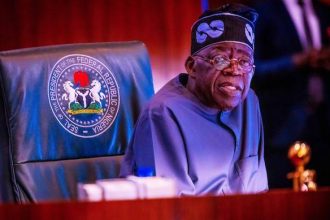The fresh $16.23 billion and 1.02 billion euro loans, and the $125 million grant approved by the Senate for the Federal Government will be used for project funding in power, digital economy, industries, education and transportation sectors.
Other priority projects are in the financial and national planning sector, women affairs, environment and climate as well as governmental institutions, The Nation learnt yesterday.
The loans and grant are part of the 2018-2020 External Borrowing (Rolling) Plan of the Federal Government.
The specific projects they are meant for implantation are contained in the report of the Senate Committee on Local and Foreign Debts.
In the power sector, the government plans to source $550 million from the World Bank and African Development Bank (AfDB). The loan of $350 (World Bank) and $200 million will be spent on the Nigeria Electrification Project (Off-Grid).
Also listed under the sector is $29.3 million to be sourced from the World Bank for a 330 KV DC North Core Interconnection of Nigeria/Niger-Benin/Togo-Burkina Faso.
Others are the $210 million World Bank facility for Nigeria Transmission Expansion Project (NTEP-1) and 245 million euros from the French Development Agency (AFD) for the Northern Corridor Transmission Projects.
According to the committee, the Nigeria Transmission Expansion Project (NTEP-1) would involve the reconstruction of two 330kV double circuit quad transmission lines (the 138km Alaoji–Onitsha and 125km Delta–Benin).
Others are the construction of one 330kV double circuit quad transmission line, 204km Kaduna–Kano; construction of two 330/132kV, 2 x 150MVA Substations at Zaria and Millennium City; and the construction of two 132/33kV, 2x60MVA Substations at Rigasa and Jaji.
Another 100 million euro AFD facility is being sought for National Digital Identity for Development Project to be implemented by the Ministry of Communications and Digital Economy.
The project to be executed in the industrial sector of the economy is the “Sovereign Guarantee for the Issuance of Eurobond as Collateral to enable Bank of Industries to fund its Projects” in the sum of 500 million euro (but no more than 750 million euro) to be funded through the International Capital Market (Eurobond).
In the education sector, the projects listed under the Ministry of Education and Universal Basic Education Commission include the Innovation Development and Effectiveness in the Acquisition of Skills (IDEAS) Project for $200 million (World Bank), Adolescent Initiative Learning and Empowerment Project (AGILE) – $500 million from World Bank, Better Education Service Delivery for All: Global Partnership for Education Grant – Additional Financing for $125 million (World Bank GPE Grant).
“The sum of $12,064,657,718.00 will be applied to projects in the transportation sector. The projects are the Lagos-Benin City segment of the Nigerian Coastal Railway Project ($3,141,984,852.00). The fund will be sourced from the China EXIM Bank; Benin-Onitsha section, including Onitsha Railway Bridge ($1,711,336,400) from China EXIM Bank); Benin City-Warri-Yenegoa-Port Harcourt segment ($2,893,693,930) from China Development Bank); Central Line Project: Abuja-Baro-Itakpe-Ajaokuta segment ($3,902,267,260.00) from Industrial and Commercial Bank of China); Lagos-Ibadan Railway Modernisation Project Construction of the Branch Line (Apapa-Tin Can Island Port) – $225,120,000.00 from China EXIM Bank and Kano-Maradi SGR with Branch to Dutse – $190,255,276.00 (European ECA/KWF/IPEX/AFC)”.
The projects in the financial and national planning sector at $1,038,500,000.00, which are domiciled in the Ministry of Finance, Budget and National Planning, are the Nigeria Power Sector Recovery Performance-Based Programme at $750,000,000.00, to be funded by the World Bank and COVID-19 Response Support Programme (C19RSP) – $288,500,000.00, to be funded by the AfDB.
Under the health sector, the Ministry of Health and National Centre for Disease Control (NCDC) are to utilise $1,075,000,000.00 for the following projects: Accelerating Nutrition Results in Nigeria Project (ANRiN) – $225 million to be funded by the World Bank, Multi-Phased Programmatic Approach-Immunization Plus and Malaria Progress by accelerating Coverage and Transforming Service (IMPACT) Project Immunisation Plus – $450million (World Bank) and Nigeria COVID-19 Preparedness and Response Project (COPREP)- Additional Financing – N400 million to be funded by the World Bank.
“The sum of $100 million earmarked for women affairs is meant to execute the Nigeria for Women Project (NFWP) by the Ministry of Women Affairs to be funded by the World Bank”.
On the environment and climate change, the ministry of the environment is to finance the execution of the Nigeria Erosion and Watershed Management Project – Additional Funding and the Climate Adaptation Erosion & Watershed Project at the cost of $400 million to be financed by the World Bank and 175 million euro to be funded by European Investment Bank respectively.
On the projects under Governmental Institution, the National Assembly is to benefit to the tune of $62,120,000.00 meant for the provision of 17MW Hybrid Solar Power Infrastructure for National Assembly. The project is to be funded by SINOCURE/Standard Chartered Bank.
Analysts at Afrinvest Securities, an investment and finance firm, believe the government should focus on promoting private sector funding of critical infrastructure and public sector efficiency.
They said: “The share of debt service to revenue is estimated to remain well above 70 per cent over the short-to-medium term, given the sticky revenue base and ever-growing recurrent expenditure size.
“The reluctance of the government to plug the different sources of leakages, such as subsidy payments on energy items and the over-bloated public sector, would continue to compel more domestic and external borrowings, thereby heightening the risk of debt sustainability over the foreseeable future.”












